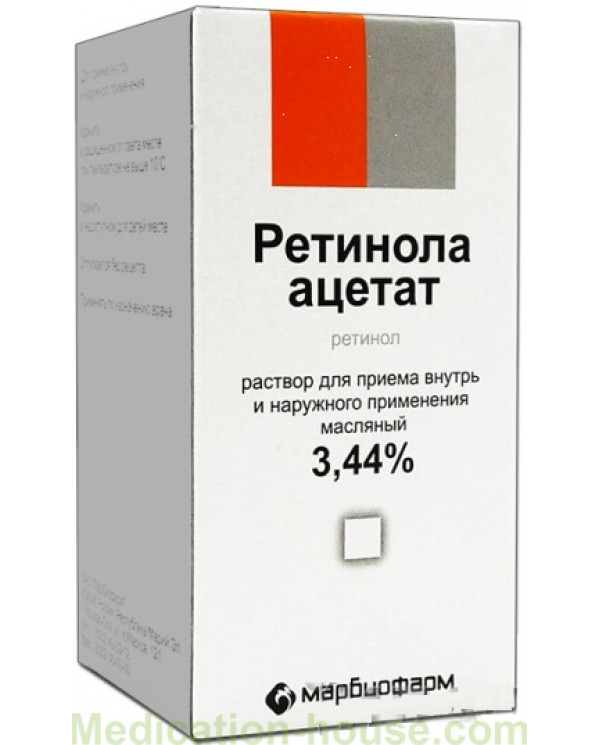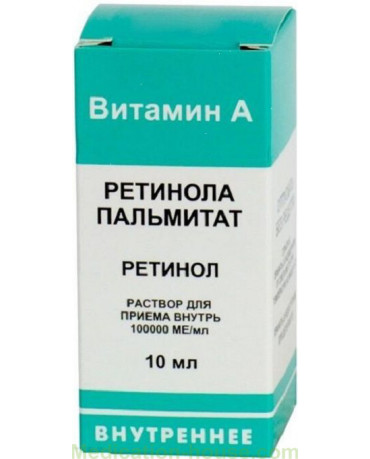Instruction for Retinol Acetate
You can buy Retinol Acetate here
pharmachologic effect
Retinol acetate (vitamin A) is a fat-soluble vitamin that is involved in metabolism. Vitamin A is necessary for normal growth and development of the body, supports visual function, stimulates regeneration and epithelialization, improves the nonspecific immune response and increases the body's resistance in adverse environmental conditions.
The oil solution of Retinol acetate eliminates the deficiency of vitamin A, which is caused by malnutrition, diseases of the digestive tract (in which the intestinal absorption of retinol is reduced) and the liver.
Retinol acetate is absorbed in the upper small intestine. The peak plasma concentration of retinol when administered orally is reached within 4 hours. The drug creates high concentrations of vitamin A in the retina and liver, slightly lower concentrations are found in the kidneys, fat depots, and endocrine glands.
Excreted by the kidneys in the form of metabolites and the liver unchanged, the half-life of retinol reaches 9 hours.
Indications for use
Retinol acetate is intended for the treatment of patients suffering from hypo-and avitaminosis A, retinitis pigmentosa, xerophthalmia, superficial keratitis, hemelopia, conjunctivitis, pyoderma, corneal lesions and eczematous eyelid lesions.
Retinol acetate solution is used in the treatment of patients with rickets, acute lung and bronchial diseases, hypotrophy, collagenosis, skin lesions (as a means of stimulating regeneration and epithelization), as well as acute respiratory diseases occurring against the background of exudative diathesis.
Vitamin A can also be prescribed in the complex therapy of erosive-ulcerative and inflammatory diseases of the gastrointestinal tract and cirrhosis of the liver.
Retinol acetate is prescribed as a prophylactic agent in patients with an increased risk of formation of calculi in the urinary tract.
Mode of application
Retinol acetate is intended for oral and external use. Oral drug is recommended to be taken 10-15 minutes after a meal.
Adults with vitamin A deficiency are usually prescribed 1-2 drops of the drug twice or three times a day orally.
Adults with skin diseases are usually prescribed 5-10 drops of the drug twice a day (in combination with vitamin B2 in a daily dose of 20 mg) orally.
In case of skin lesions, external application of the solution under a gauze bandage is prescribed up to 6 times per day (in combination with oral administration of vitamin A).
Children with skin diseases, as a rule, are prescribed, depending on the age, 1-2 drops of the drug per day orally.
The maximum recommended single dose for adults is 50000ME (10 drops of Retinol acetate solution).
The maximum recommended single dose for children over 7 years old is 5000ME (1 drop).
The maximum recommended daily intake for adults is 100,000 ME (20 drops).
The maximum recommended daily dose for children over 7 years old is 20000ME (4 drops).
Side effects
Retinol acetate, as a rule, is well tolerated by patients, there are data on isolated cases of hypersensitivity reactions, which require discontinuation of the drug.
With prolonged therapy with vitamin A (especially when using high doses), chronic overdose and hypervitaminosis A may develop, the symptoms of which are headache, pain in the bones of the lower limbs, drowsiness, irritability, hyperthermia, excessive sweating, oliguria and exanthema.
With the development of these symptoms, you should immediately stop taking the drug Retinol Acetate and consult a doctor.
Contraindications
Retinol acetate is not prescribed to patients with individual hypersensitivity to vitamin A and soybean oil.
Oral use of the drug is contraindicated in children under 7 years of age.
Care should be taken when prescribing retinol acetate to patients suffering from acute and chronic nephritis and decompensated heart failure.
Pregnancy
Particular care should be taken when prescribing the drug Retinol Acetate in the first trimester of pregnancy (take into account the intake of vitamin A from food and other sources in connection with the rice development of the teratogenic effect of retinol acetate). The maximum recommended daily dose for pregnant women in the second and third trimester is 5000ME (1 drop of Retinol Acetate solution).
Data on the use of an oil solution during lactation is not.
Drug interactions
With the combined use of a solution of Retinol acetate with liquid paraffin, there is a decrease in the absorption of vitamin A in the intestine.
With simultaneous use of retinol acetate with some carotenoids, notes the improvement of the immunobiological functions of the body and slows down the process of epithelial malignancy.
Prohibited the combined use of a solution of oil Retinol acetate with other drugs containing vitamin A.
Overdose
When high doses of retinol acetate are used in patients, headaches, vomiting, drowsiness, ataxia, irritability and pain in the bones of the lower legs may develop.
There is no specific antidote. In case of an overdose of retinol acetate, discontinue use of the drug and consult your doctor. For the treatment of overdose prescribed laxatives. In case of poisoning with retinol acetate, it is possible to prescribe symptomatic therapy and forced diuresis.
Storage conditions
The oil solution of retinol acetate should be stored no more than 2 years after the release in rooms with a temperature of 8 to 15 ° C.
Terms of sell
You can buy Retinol Acetate without a prescription.


